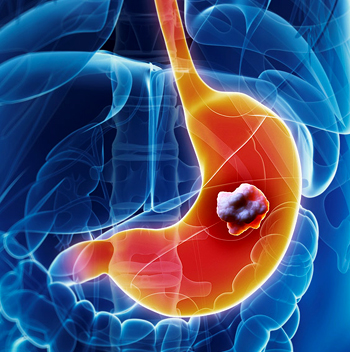BACKGROUND
Stomach cancer happens when normal cells in the stomach change into abnormal cells and grow out of control. The stomach is part of the digestive system. There are different kinds of stomach cancer, depending on the type of cells and part of the stomach involved.
Some people who get stomach cancer have a condition called H. pylori infection. H. pylori is a type of bacteria that can infect the stomach and intestines. It sometimes causes symptoms such as belly pain, bloating, nausea, or vomiting.
DISEASE OCCURRENCE IN POPULATION
The American Cancer Society estimated that about 26,240 cases of stomach cancer (16,520 in men and 9,720 in women) will be diagnosed in 2018. Median age at diagnosis is 68 years. Gastric cancer is the 15th most common cancer in the United State.
Stomach cancer is the fourth most common cause of death from cancer. The World Health Organization estimates that in 2015, gastric cancer accounted for 754,000 deaths worldwide.
In Pakistan one study shows that carcinoma stomach was seen mostly in young male patients, presenting late with advanced disease in stage III and IV in emergency. Only 33% tumors were resectable while 66.7% patients were managed by palliative treatment. Overall mortality was 13.3% due to its late presentation. Mortality rate of gastric cancer in Pakistan is 6541 deaths per year.

RISK FACTORS
Risk factors include:
- Gender: Stomach cancer is more common in men than in women.
- Age: There is a sharp increase in stomach cancer rates in people over the age of 50. Most people diagnosed with stomach cancer are between their late 60s and 80s.
- Ethnicity: In the United States, stomach cancer is more common in Hispanic Americans, African Americans, and Asian/Pacific Islanders than it is in non-Hispanic whites.
- Helicobactor pylori infection: Infection with Helicobacter pylori (H. pylori) bacteria seems to be a major cause of stomach cancer, especially cancers in the lower (distal) part of the stomach. Long-term infection of the stomach with this germ may lead to inflammation (called chronic atrophic gastritis) and pre-cancerous changes of the inner lining of the stomach.
- Stomach lymphoma: People who have had a certain type of lymphoma of the stomach known as mucosa-associated lymphoid tissue (MALT) lymphoma have an increased risk of getting adenocarcinoma of the stomach. This is probably because MALT lymphoma of the stomach is caused by infection with H pylori bacteria.
- Diet: An increased risk of stomach cancer is seen in people with diets that have large amounts of smoked foods, salted fish and meat, and pickled vegetables. Nitrates and nitrites are substances commonly found in cured meats. They can be converted by certain bacteria, such as H. pylori, into compounds that have been shown to cause stomach cancer in lab animals.
- Tobacco use: Smoking increases stomach cancer risk, particularly for cancers of the upper portion of the stomach near the esophagus. The rate of stomach cancer is about doubled in smokers.
- Previous stomach surgery: Stomach cancers are more likely to develop in people who have had part of their stomach removed to treat non-cancerous diseases such as ulcers.
- Pernicious anemia: Certain cells in the stomach lining normally make a substance called intrinsic factor (IF) that we need to absorb vitamin B12 from foods. People without enough IF may end up with a vitamin B12 deficiency, which affects the body’s ability to make new red blood cells and can cause other problems as well. This condition is called pernicious anemia. Along with anemia (too few red blood cells), people with this disease have an increased risk of stomach cancer.
- Type A blood: Blood type groups refer to certain substances that are normally present on the surface of red blood cells and some other types of cells. These groups are important in matching blood for transfusions. For unknown reasons, people with type A blood have a higher risk of getting stomach cancer.
SIGN AND SYMPTOMS
Early on, stomach cancer might not cause any symptoms. When stomach cancer causes symptoms, they can include:
-
- Weight loss
- Belly pain, especially in the upper belly
- Trouble swallowing
- Having no appetite, or feeling full after eating a small amount of food
- Nausea
- Feeling tired or short of breath (from a condition called “anemia,” which is when people have too few red blood cells)
All of these symptoms can also be caused by conditions that are not stomach cancer. But if you have these symptoms, tell your doctor or nurse.
DIGNOSTIC TESTS
Tests for stomach cancer can include:
- Upper endoscopy: This is the test most often done for stomach cancer. During this test, the doctor puts a thin tube with a camera and light on the end into the mouth and down into the stomach. This lets the doctor look at the stomach lining.
- Biopsy: Doctors do this test during an upper endoscopy. During a biopsy, the doctor takes a small sample of tissue from an abnormal-looking area of the stomach. Then another doctor looks at the tissue under a microscope.
- Blood tests
- Imaging tests of the stomach, such as a CT scan or ultrasound – Imaging tests create pictures of the inside of the body.
- Pylori detection: Your doctor will also check for H. pylori infection. Doctors can do this in different ways, including breath tests, blood tests, and other lab tests.
TREATMENT OPTIONS
Stomach cancer is usually treated with one or more of the following:
Surgery to remove the cancer: During surgery, the doctor might remove part or all of your stomach. If the doctor removes all of your stomach, he or she will reconnect your digestive tract so that you can eat.
Chemotherapy: Chemotherapy is the term doctors use to describe a group of medicines that kill cancer cells. Sometimes, people get chemotherapy before they have surgery.
Radiation therapy: Radiation kills cancer cells.
Stomach cancer can sometimes be cured with treatment. This is most likely when the cancer is found at an early stage. But, often, stomach cancer is not found at an early stage. If your stomach cancer cannot be cured, your doctor can do other treatments to help with your symptoms.
If you have H. pylori infection, your doctor will treat it with medicines. This usually involves taking 3 or more medicines for 1 to 2 weeks. Treating the H. pylori infection will make the infection go away, but it will not make the stomach cancer go away.
PRECAUTIONS
It’s not clear what causes gastroesophageal junction or stomach cancer, so there’s no way to prevent it. But you can take steps to reduce your risk of gastroesophageal junction cancer and stomach cancer by making small changes to your everyday life. For instance, try to:
- Exercise: Regular exercise is associated with a reduced risk of stomach cancer. Try to fit physical activity into your day most days of the week.
- Eat more fruits and vegetables: Try to incorporate more fruits and vegetables into your diet each day. Choose a wide variety of colorful fruits and vegetables.
- Reduce the amount of salty and smoked foods you eat: Protect your stomach by limiting these foods.
- Stop smoking: If you smoke, quit. If you don’t smoke, don’t start. Smoking increases your risk of stomach cancer, as well as many other types of cancer. Quitting smoking can be very difficult, so ask your doctor for help.
REFERENCES
- https://emedicine.medscape.com/article/278744-overview#a7
- American Cancer Society. Key statistics for stomach cancer. American Cancer Society. Available at http://www.cancer.org/cancer/stomachcancer/detailedguide/stomach-cancer-key-statistics. January 5, 2018; Accessed: April 24, 2018
- Surveillance, Epidemiology, and End Results Program. SEER Stat Fact Sheets: Stomach Cancer. National Cancer Institute. Available at http://seer.cancer.gov/statfacts/html/stomach.html. Accessed: April 24, 2018.
- Global Cancer Facts & Figures, 3rd ed. American Cancer Society. Available at https://www.cancer.org/content/dam/cancer-org/research/cancer-facts-and-statistics/global-cancer-facts-and-figures/global-cancer-facts-and-figures-3rd-edition.pdf. Accessed: April 24, 2018.
- World Health Organization. Cancer. WHO. Available at http://www.who.int/mediacentre/factsheets/fs297/en/. February 1 2018; Accessed: April 24, 2018.
- Daniyal M, Akram M (2015). Risk factors and epidemiology of gastric cancer in Pakistan: Mini Review, Asian Pacific Journal of Cancer Prevention; 16(12):4821-4824
- http://www.uptodate.com/contents/stomach-cancer-the-basics?source=search_result&search=gastric+cancer+patient+information&selectedTitle=1~150
- https://www.mayoclinic.org/diseases-conditions/stomach-cancer/symptoms-causes/syc-20352438
